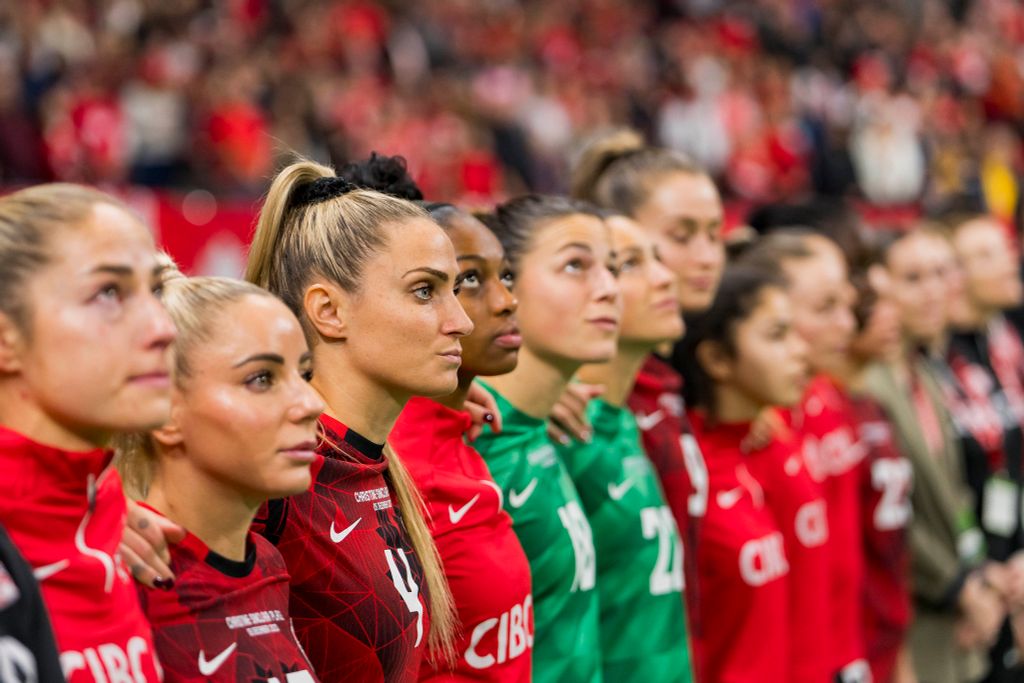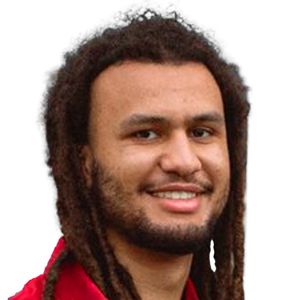3 KEY takeaways from the CanWNT's 2024 Concacaf W Gold Cup roster

It was missing a familiar face as expected, but it was otherwise business as usual.
That, of course, was the latest Canadian Women’s National Team squad, released this week ahead of the 2024 Gold Cup later this month.
The first Canadian squad since Christine Sinclair’s international retirement, it was quite strange to see her name not on the list, given her importance to this team over the decades, but despite that, it was still a strong 23-player squad called in by Bev Priestman.
It was missing a few names - Janine Beckie and Desiree Scott were surprisingly left out from the final squad as they continued their respective recovery from major knee injuries, Marie-Yasmine Alidou was also left at home despite her red-hot form in Portugal, while new faces Megan Reid and Laurence Gladu (along with Scott) were called in for a training roster before the tournament, but other than that, it was a pretty straightforward squad for Priestman to call in.
Yet, that’s no surprise, given what this tournament represents for her team, both in the present and future.
A chance to stake out a claim towards being Concacaf’s top team at the moment and win a trophy, there is also a chance for Canada to continue their preparations for the summer Olympics, which are rapidly approaching here.
And the latter is what will likely fuel a lot of Canada’s decisions at this tournament. Of course, winning is a priority - Canada’s last trophy within Concacaf came back in 2010, something they’d love to change - but as the defending Olympic gold medallists, they want to do everything in their power to defend that crown as valiantly as possible in Paris this summer.
Because of that, that might also help explain why names like Beckie and Scott were left out - the message there was likely to go out and win a spot for their club teams after missing all of last year with injuries - as well as why Priestman otherwise called in about as strong as a squad as possible with little experimentation, showing that her main task is figuring out how she’ll get her core group of 25 or so players down to an Olympic squad, be it 18 or 23.
So while the immediate goal will be for this squad to now go out and win this tournament, it’ll be interesting to see how they balance that with Olympic preparations, knowing how important that competition will be for a team that always seems to rise for that occasion every four years.
On that note, however, here’s a look at some other key takeaways from this squad announcement.
Alidou’s omission a sign of a crowded frontline:
When this squad dropped, there was a name that donned the lips of many - Marie-Yasmine Alidou.
For those who haven’t watched her play recently, it will have been surprising to see all of the chatter surrounding the 28-year-old with just one Canadian cap to her name, but her club performances have gotten people talking for a reason.
Having just hit 20 goals in her debut season with Benfica for Portugal, after having scored 25 combined pro goals in her entire career up to this point, she’s been having a breakout campaign, one that hasn’t gone unnoticed by Canadians.
She missed out on #CanWNT/#CanXNT’s Gold Cup squad, but Marie Yasmine Alidou kept up her scoring form today, bagging her 20th goal for Benfica (all competitions)
— Alexandre Gangué-Ruzic (@AlexGangueRuzic) February 7, 2024
🇨🇦 has a crowded forward line for the GC, but would’ve loved to see her get a call somehowpic.twitter.com/IF0Jb1aFQz
Given that she’s recently scored goals against the defending UEFA Champions League winners, Barcelona, for example, that hype is only continuing to grow, too.
And seeing the success that Canada has had with past players who have donned Benfica’s colours - namely, one Cloé Lacasse, it’s felt like a no-brainer to call her up amidst this form.
Yet, despite all of that, Alidou’s name was surprisingly left off of Wednesday’s list, much to the shock of those who had been following her closely.
When asked why that was the case, Bev Priestman noted that she’s wanted to see more of Alidou in her new position for club - she’s playing as more of an out-and-out forward with Benfica after being more of a midfielder at past stops - before also noting that she was also hesitant to call in Alidou after doing so several times over the last few years, and never being able to give her minutes, with her one cap coming back in February of 2022.
While that answer must feel harsh from Alidou’s perspective, who will have felt that she’s done enough to earn more minutes for Canada, it’s worth noting that this situation just shows Canada’s current situation up front.
There, Priestman has her hands full at the moment. Despite not calling in Alidou, she’s still got eight forwards on this latest roster, which are Adriana Leon, Jordyn Huitema, Nichelle Prince, Deanne Rose, Evelyne Viens, Cloé Lacasse, Clarissa Larisey and Olivia Smith (who was listed as both a forward and midfielder). And that’s despite not calling in Janine Beckie, who despite playing more as a full back and wing back when healthy for Canada, is still naturally more of an attacking player.
Because of that, while Alidou should be in the mix to be among that group, that just shows that at the moment, the battle for Canada’s front three extends to 10 names, who all have legitimate reasons as to why they could start in one of the starting positions in Priestman’s 3-4-2-1.
Bev Priestman on Alidou h/t @MeaghenJohnson: "I think [Alidou's] done fantastic at Benfica — but at this point, she needs to be assessed in the position that she's playing at club, and you can see there's a lot of players in those front three positions."#CanWNT/#CanXNT
— Canucks Abroad (@Canucks_Abroad) February 7, 2024
That’s where Priestman’s headache lies, as heading into the Olympics, where it looks like they’ll be rosters of 18 players once again after a special exemption to 22 in 2021, she’ll have to somehow whittle that group of 10 into five or six, at most.
And even beyond these Olympics, it’ll be tough to fit those 10 into rosters of 23, which usually rarely include more than seven or eight attackers, meaning that some will continue to be left out.
So while it can be argued that Alidou deserves a look, helping further stoke the fires of competition in that group, the battle for spots will rage on regardless, with Alidou’s omission just showing how tough it is to split things at the moment.
What battles to keep an eye on?
But while the frontline may be the most entertaining battle to keep an eye on, with Prince, Lacasse and Leon currently having the edge based on recent performances (and Huitema, Viens and Rose on their heels), that’s not the only positions where Priestman will have some tough decisions to make. 
To begin, there’s at centre back, where there’s a fierce battle for the third spot beside Kadeisha Buchanan and Vanessa Gilles remains tight between Shelina Zadorsky and Jade Rose. Rose has the edge for now, but with Zadorksy back and playing well in the WSL with new side West Ham, she could easily snatch a spot back with some good performances for club and country.
In a tournament like this, that competition will be valuable, allowing Priestman to rotate her centre backs, but she might only have the room to bring three of the four to the Olympics, which could lead to an awkward omission of a regular like a Zadorsky or Rose.
Then, at full back, Ashley Lawrence, Jayde Riviere and Sydney Collins have been the main trusted options, but that battle for a potential fourth spot is quite interesting. Could it be Gabrielle Carle, called in for this camp? Or Bianca St-Georges, who had some good auditions last year?
And that’s without considering Jade Rose, who can also slot in at this position, as well as Janine Beckie, with the latter’s versatility being a big reason why she’s a lock for the Olympics if fully healthy, as her ability to cover multiple positions could allow Priestman to gamble on bringing another player in the attack.
Lastly, in midfield, it’ll be interesting to see who can nab a spot after Jessie Fleming, Quinn and Julia Grosso. Simi Awujo looks to be a frontrunner, having put up some excellent performances for Canada over the last 18 months, but a healthy Desiree Scott brings a lot of defensive value to a team that has sometimes lacked it in her absence. With likely only room for four midfielders, one of those two could end up being left behind, even if you’d ideally like to have both in a squad.
Yet, this is just a glimpse of the dilemma that Priestman faces when picking an Olympic squad, as it’ll be important to make sure that she can pick as flexible of an 18-player squad as possible.
For now, that raises the odds for players who can play multiple positions, so look for some players to try and flex their skills in that department in that tournament, filling different roles.
At the same time, those who specialize in one area will want to show that they’re indispensable at what they do, which could lead to some inspired showings from some of the attackers, for example.
Safe to say, while it’s not sure how Canada might look as they experiment with lineups and combinations, these auditions could lead to some spirited performances, which would be huge.
Can Canada snap their Concacaf drought?
But while this tournament is a key chance for Olympic prep and auditions, it’s worth noting that Canada’s got a unique opportunity to do something they haven’t done in nearly 14 years - win a trophy in Concacaf.
Coming back at the 2010 Concacaf Championships, where Canada defeated Mexico 1-0 thanks to a Christine Sinclair penalty to earn that crown, it’s been a long time since they’ve been able to emulate a similar feeling. 
Now, however, they can change that. With Mexico fresh off of missing the last World Cup, and the US in the middle of a transition phase as new head coach Emma Hayes gets set to begin later this year, Canada can arguably be considered the favourites to win it all this tournament.
Especially given that they brought more of a first-choice squad, with the US choosing to go for more of a younger group as they look at new names, that sentiment is further reflected in that reality.
Of course, this US side is still very dangerous, and should still be considered favourites given the talent in their ranks, Canada should feel like they can compete for a trophy in this tournament.
They won’t be expected to walk over their competition - guest nations Brazil and Argentina can cause problems, and Costa Rica is never an easy game - but Canada will want to lean into that sort of winning mentality.
If they’re to defend their Olympic gold medal this summer, they’re going to need to get used to that feeling of wanting to be the hunters instead of the hunted, especially given that a lot of opponents will look to make them feel like the latter as they try to slow them down and deny them of another gold medal.

